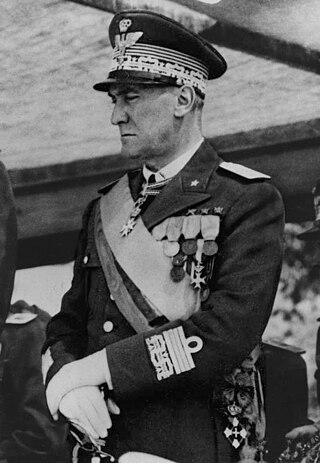
Rodolfo Graziani, 1st Marquis of Neghelli, was a prominent Italian military officer in the Kingdom of Italy's Regio Esercito, primarily noted for his campaigns in Africa before and during World War II. A dedicated fascist and prominent member of the National Fascist Party, he was a key figure in the Italian military during the reign of Victor Emmanuel III.

Lion of the Desert is a 1980 epic historical war film about the Second Italo-Senussi War, starring Anthony Quinn as Libyan tribal leader Omar Mukhtar, a Bedouin leader fighting the Regio Esercito, and Oliver Reed as Italian General Rodolfo Graziani, who defeated Mukhtar. It was directed by Moustapha Akkad and funded by the government under Colonel Muammar Gaddafi.
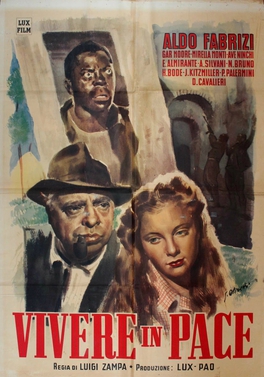
To Live in Peace is a 1947 Italian neorealist comedy-drama war film directed by Luigi Zampa and starring Aldo Fabrizi, John Kitzmiller and Ave Ninchi.

Mario Camerini was an Italian film director and screenwriter.

Lo squadrone bianco is a 1936 Italian film directed by Augusto Genina. The plot features a cavalry lieutenant, unlucky in love, who redeems himself by battling the "rebels" of Tripolitania. The film won the Mussolini Cup at the Venice Film Festival, during the Second Italo-Abyssinian War.

Libya was a colony of Fascist Italy located in North Africa, in what is now modern Libya, between 1934 and 1943. It was formed from the unification of the colonies of Italian Cyrenaica and Italian Tripolitania, which had been Italian possessions since 1911.
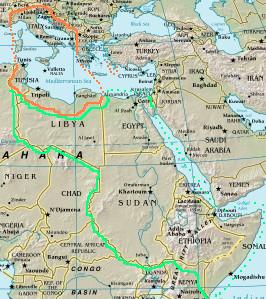
Imperialism, colonialism and irredentism played an important role in the foreign policy of Fascist Italy. Among the regime's goals were the acquisition of territory considered historically Italian in France and Yugoslavia, the expansion of Italy's sphere of influence into the Balkans and the acquisition of more colonies in Africa. The pacification of Libya (1923–32), the invasion of Ethiopia (1935–36), the invasion of Albania (1939), the invasion of France (1940), the invasion of Greece (1940–41) and the invasion of Yugoslavia (1941) were all undertaken in part to add to Italy's national space. According to historian Patrick Bernhard, Fascist Italian imperialism under Benito Mussolini, particularly in Africa, served as a model for the much more famous expansionism of Nazi Germany in Eastern Europe.

The Libyan resistance movement was the rebel force opposing the Italian Empire during its Pacification of Libya between 1923 and 1932.

Arab Lictor Youth was a fascist youth organization for Arab youth in Italian Libya.
Angelo Del Boca was an Italian historian. He specialized in the study of the Italian Colonial Empire, and the involvement in Libya, Ethiopia, Eritrea, and Somalia during the first part of 20th century. Del Boca was the first post-WWII Italian scholar to devote himself extensively to the study of Fascist Italy's expansion in Africa, and to publish information on the crimes committed by the Italian army in Ethiopia and Libya during its period of Fascism and World War II. He was editor of the Anti-Fascist newspaper Il Giorno, and professor of Contemporary History in the University of Turin's Faculty of Political Science. He took part in the Italian resistance movement. In 2002 Del Boca received an Honorary Doctorate from the University of Lucerne.
Corrente di Vita was a biweekly Italian culture magazine published between 1938 and 1940.

Gazzetta del Popolo was an Italian daily newspaper founded in Turin, in northern Italy, on 16 June 1848. It ceased publication on 31 December 1983 after 135 years of operation. Italian novelist Alberto Moravia is among the former contributors to the paper.

The Great Appeal is a 1936 Italian war film directed by Mario Camerini and starring Camillo Pilotto, Roberto Villa and Lina d'Acosta. It is sometimes known by the alternative title The Last Roll-Call.
Piero Carnabuci was an Italian stage and film actor.
Carlo Benetti (1885–1949) was an Italian film actor of the silent era. During the sound era he worked as production manager on a number of films.
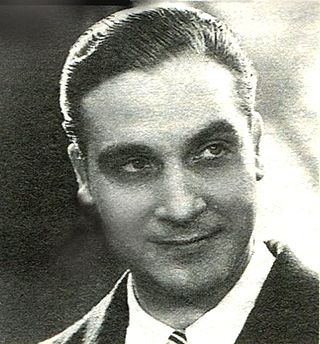
Marcello Spada (1905–1995) was an Italian film actor. He appeared in a dozen films, often in the leading role, between 1928 and 1937. After retiring from cinema he later became a doctor.
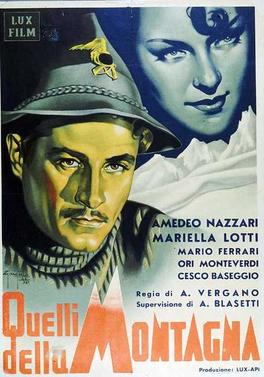
Men of the Mountain is a 1943 Italian war drama film directed by Aldo Vergano and starring Amedeo Nazzari, Mariella Lotti and Mario Ferrari. Along with The Three Hundred of the Seventh, it was one of a handful of films portraying the Alpini units of the Italian Army.

Ruth Ben-Ghiat is an American historian and cultural critic. She is a scholar on fascism and authoritarian leaders. Ben-Ghiat is professor of history and Italian studies at New York University.
Alberto Pasquali (1882–1929) was an Italian stage and film actor of the silent era.














